
Michal Grahn
@grahn.bsky.social
Assistant Professor & docent in political science at Uppsala University & @uppgap.bsky.social.
Pol behavior, public opinion, sexuality & gender, experiments, register data.🇸🇪🏳️🌈
AE @respol.bsky.social
Web: michalgrahn.com
Pol behavior, public opinion, sexuality & gender, experiments, register data.🇸🇪🏳️🌈
AE @respol.bsky.social
Web: michalgrahn.com
This week, @uu-polisci.bsky.social were lucky to host @danjdevine.bsky.social from and learn more about his exciting new research on accent-based candidate evaluation.


October 25, 2025 at 7:21 AM
This week, @uu-polisci.bsky.social were lucky to host @danjdevine.bsky.social from and learn more about his exciting new research on accent-based candidate evaluation.
📄Is there public support for tariffs in Europe -- as a protectionist measure, a tool of retaliation, or a way to fund the green transition?
Our timely conjoint experiment, fielded in two core European constituencies 🇩🇪 🇬🇧, shows no public appetite for tariffs in Europe.
doi.org/10.1080/1350...
Our timely conjoint experiment, fielded in two core European constituencies 🇩🇪 🇬🇧, shows no public appetite for tariffs in Europe.
doi.org/10.1080/1350...

October 15, 2025 at 6:47 AM
📄Is there public support for tariffs in Europe -- as a protectionist measure, a tool of retaliation, or a way to fund the green transition?
Our timely conjoint experiment, fielded in two core European constituencies 🇩🇪 🇬🇧, shows no public appetite for tariffs in Europe.
doi.org/10.1080/1350...
Our timely conjoint experiment, fielded in two core European constituencies 🇩🇪 🇬🇧, shows no public appetite for tariffs in Europe.
doi.org/10.1080/1350...
Check out this Elgar Encyclopedia entry on Political behavior of LGBT+ people penned by @wurthmann.bsky.social and myself. The piece summarizes what we know about queer political behavior and identifies some the remaining gaps. 🏳️🌈
www.researchgate.net/publication/...
www.researchgate.net/publication/...

August 14, 2025 at 9:24 AM
Check out this Elgar Encyclopedia entry on Political behavior of LGBT+ people penned by @wurthmann.bsky.social and myself. The piece summarizes what we know about queer political behavior and identifies some the remaining gaps. 🏳️🌈
www.researchgate.net/publication/...
www.researchgate.net/publication/...
My trip back from #epsa2025 by #train was a joy. 4k km, well-functioning AC (needed in the heat). Amazed at the amazing public transport network Europe offers. Door to door, just public transport. #sustainabletravel #climatechange @epssnet.bsky.social




July 2, 2025 at 1:06 PM
My trip back from #epsa2025 by #train was a joy. 4k km, well-functioning AC (needed in the heat). Amazed at the amazing public transport network Europe offers. Door to door, just public transport. #sustainabletravel #climatechange @epssnet.bsky.social
Attending EPSA 2025 and have nothing planned this afternoon? Consider attending two great back-to-back panels on gender & radical right.☀️


June 26, 2025 at 6:13 AM
Attending EPSA 2025 and have nothing planned this afternoon? Consider attending two great back-to-back panels on gender & radical right.☀️
5/ The answer? Not really. 🎯 Across both methods and groups, we find strikingly similar preferences for politically underrepresented profiles — especially women and young candidates, but also those with higher education and public sector backgrounds.

June 6, 2025 at 9:44 AM
5/ The answer? Not really. 🎯 Across both methods and groups, we find strikingly similar preferences for politically underrepresented profiles — especially women and young candidates, but also those with higher education and public sector backgrounds.
🧵1/ Are primaries bad for political diversity? Conventional wisdom says yes—but our article in @wepsocial.bsky.social shows that candidate selection modes are not necessarily a bottleneck for representation, at least when it comes to demand. 🗳️👥 @sandrahkansson.bsky.social
doi.org/10.1080/0140...
doi.org/10.1080/0140...
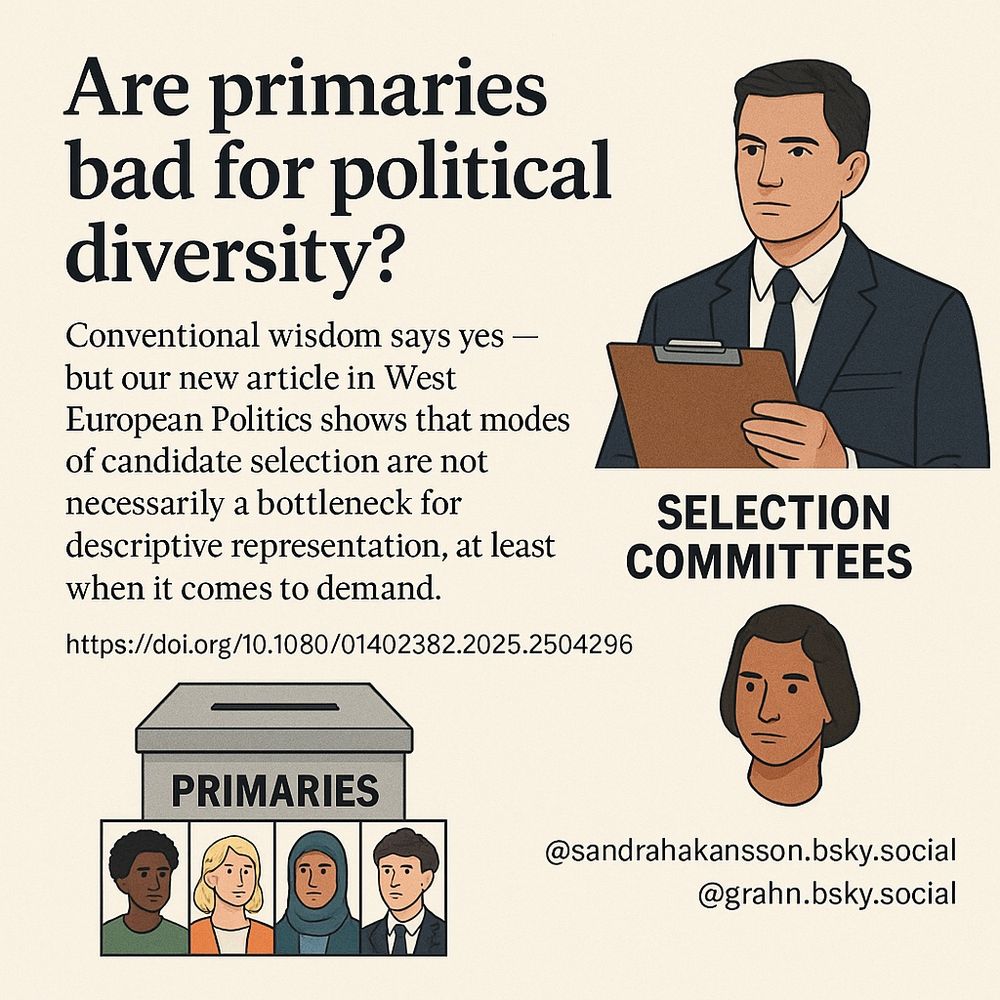
June 6, 2025 at 9:44 AM
🧵1/ Are primaries bad for political diversity? Conventional wisdom says yes—but our article in @wepsocial.bsky.social shows that candidate selection modes are not necessarily a bottleneck for representation, at least when it comes to demand. 🗳️👥 @sandrahkansson.bsky.social
doi.org/10.1080/0140...
doi.org/10.1080/0140...
We also find strong evidence that AFFECTIVE POLARIZATION spills over into the spiritual domain.
Respondents with intense partisan animosity are more likely to reject papal candidates aligned with their political outgroup’s values.
People take their politics to mass.
Respondents with intense partisan animosity are more likely to reject papal candidates aligned with their political outgroup’s values.
People take their politics to mass.

May 9, 2025 at 9:01 AM
We also find strong evidence that AFFECTIVE POLARIZATION spills over into the spiritual domain.
Respondents with intense partisan animosity are more likely to reject papal candidates aligned with their political outgroup’s values.
People take their politics to mass.
Respondents with intense partisan animosity are more likely to reject papal candidates aligned with their political outgroup’s values.
People take their politics to mass.
The results largely confirm our prereg hypotheses.
🔵 Liberals gravitate toward progressive, reform-minded candidates, critical of dictators.
🔴 Conservatives prefer doctrinal conservatism and diplomatic neutrality.
Despite these divides, both groups favor a Pope who stays out of politics.
🔵 Liberals gravitate toward progressive, reform-minded candidates, critical of dictators.
🔴 Conservatives prefer doctrinal conservatism and diplomatic neutrality.
Despite these divides, both groups favor a Pope who stays out of politics.

May 9, 2025 at 9:01 AM
The results largely confirm our prereg hypotheses.
🔵 Liberals gravitate toward progressive, reform-minded candidates, critical of dictators.
🔴 Conservatives prefer doctrinal conservatism and diplomatic neutrality.
Despite these divides, both groups favor a Pope who stays out of politics.
🔵 Liberals gravitate toward progressive, reform-minded candidates, critical of dictators.
🔴 Conservatives prefer doctrinal conservatism and diplomatic neutrality.
Despite these divides, both groups favor a Pope who stays out of politics.
On average, Americans prefer a liberal Pope—someone who supports same-sex marriage, climate reform, ordaining women, and confronting authoritarian leaders.
But: they want these views without political engagement.
The ideal Pope is progressive—but apolitical.
But: they want these views without political engagement.
The ideal Pope is progressive—but apolitical.

May 9, 2025 at 9:01 AM
On average, Americans prefer a liberal Pope—someone who supports same-sex marriage, climate reform, ordaining women, and confronting authoritarian leaders.
But: they want these views without political engagement.
The ideal Pope is progressive—but apolitical.
But: they want these views without political engagement.
The ideal Pope is progressive—but apolitical.
🧵 What kind of POPE do AMERICANS want?📸
Before the Conclave, @sophiemainz.bsky.social and I asked 1,500 U.S. adults to choose among hypothetical papal candidates.
Results: Americans prefer a liberal and *non-political* Pope. The latter might be challenging for Leo XIV.
Results ⬇️
Polisky Datasky
Before the Conclave, @sophiemainz.bsky.social and I asked 1,500 U.S. adults to choose among hypothetical papal candidates.
Results: Americans prefer a liberal and *non-political* Pope. The latter might be challenging for Leo XIV.
Results ⬇️
Polisky Datasky
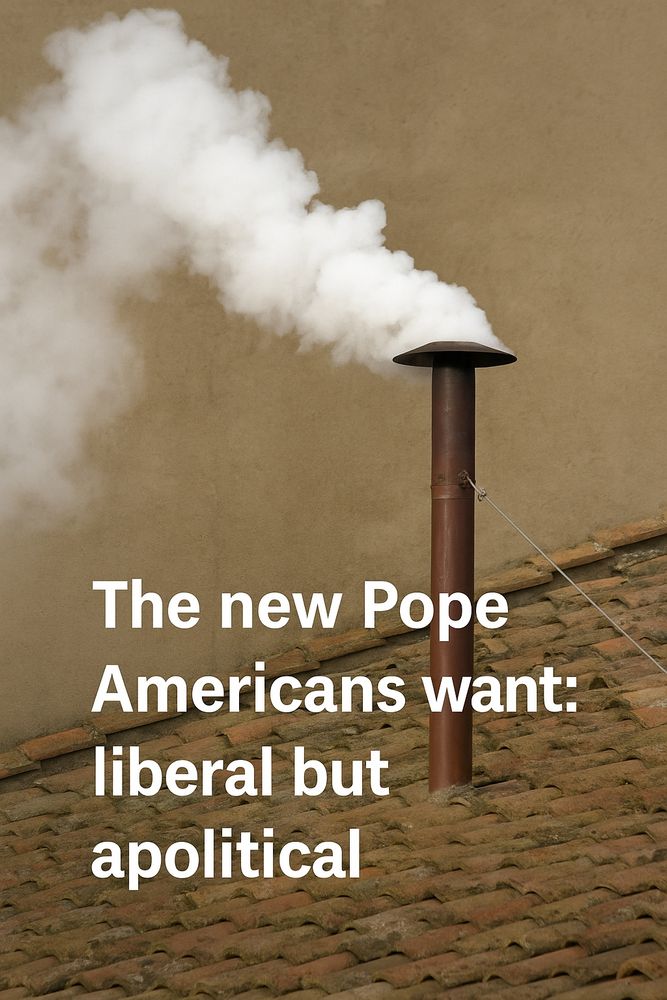
May 9, 2025 at 9:01 AM
🧵 What kind of POPE do AMERICANS want?📸
Before the Conclave, @sophiemainz.bsky.social and I asked 1,500 U.S. adults to choose among hypothetical papal candidates.
Results: Americans prefer a liberal and *non-political* Pope. The latter might be challenging for Leo XIV.
Results ⬇️
Polisky Datasky
Before the Conclave, @sophiemainz.bsky.social and I asked 1,500 U.S. adults to choose among hypothetical papal candidates.
Results: Americans prefer a liberal and *non-political* Pope. The latter might be challenging for Leo XIV.
Results ⬇️
Polisky Datasky
The results largely confirm our prereg hypotheses:
🔵 Liberals gravitate toward progressive, reform-minded candidates, critical of dictators.
🔴 Conservatives prefer doctrinal conservatism and diplomatic neutrality.
Despite these divides, both groups favor a Pope who stays out of politics.
🔵 Liberals gravitate toward progressive, reform-minded candidates, critical of dictators.
🔴 Conservatives prefer doctrinal conservatism and diplomatic neutrality.
Despite these divides, both groups favor a Pope who stays out of politics.

May 9, 2025 at 8:48 AM
The results largely confirm our prereg hypotheses:
🔵 Liberals gravitate toward progressive, reform-minded candidates, critical of dictators.
🔴 Conservatives prefer doctrinal conservatism and diplomatic neutrality.
Despite these divides, both groups favor a Pope who stays out of politics.
🔵 Liberals gravitate toward progressive, reform-minded candidates, critical of dictators.
🔴 Conservatives prefer doctrinal conservatism and diplomatic neutrality.
Despite these divides, both groups favor a Pope who stays out of politics.
On average, Americans prefer a liberal Pope—someone who supports same-sex marriage, climate reform, ordaining women, and confronting authoritarian leaders.
But: they want these views without political engagement.
The *ideal* Pope is progressive—but apolitical.
But: they want these views without political engagement.
The *ideal* Pope is progressive—but apolitical.

May 9, 2025 at 8:48 AM
On average, Americans prefer a liberal Pope—someone who supports same-sex marriage, climate reform, ordaining women, and confronting authoritarian leaders.
But: they want these views without political engagement.
The *ideal* Pope is progressive—but apolitical.
But: they want these views without political engagement.
The *ideal* Pope is progressive—but apolitical.
👥 Then we ran a conjoint experiment with 1,300 party selectors from 6 major Swedish parties.
Result? Candidates who talk about harassment are less preferred than candidates who speak up about a wide array of other issues.
The disadvantage is of a similar size as not being an incumbent.
Result? Candidates who talk about harassment are less preferred than candidates who speak up about a wide array of other issues.
The disadvantage is of a similar size as not being an incumbent.

April 10, 2025 at 9:30 AM
👥 Then we ran a conjoint experiment with 1,300 party selectors from 6 major Swedish parties.
Result? Candidates who talk about harassment are less preferred than candidates who speak up about a wide array of other issues.
The disadvantage is of a similar size as not being an incumbent.
Result? Candidates who talk about harassment are less preferred than candidates who speak up about a wide array of other issues.
The disadvantage is of a similar size as not being an incumbent.
Happy to find out that my paper Still proud at the polls belongs to #EJPR 's best cited papers of 2023. For those who missed out on the paper, I show that high levels of LGB voter mobilization do not disappear after the enactment of major LGBT+ rights. doi.org/10.1111/1475...

March 20, 2025 at 8:54 AM
Happy to find out that my paper Still proud at the polls belongs to #EJPR 's best cited papers of 2023. For those who missed out on the paper, I show that high levels of LGB voter mobilization do not disappear after the enactment of major LGBT+ rights. doi.org/10.1111/1475...
This view this morning. 🥰 Department of Government, Uppsala University polisky
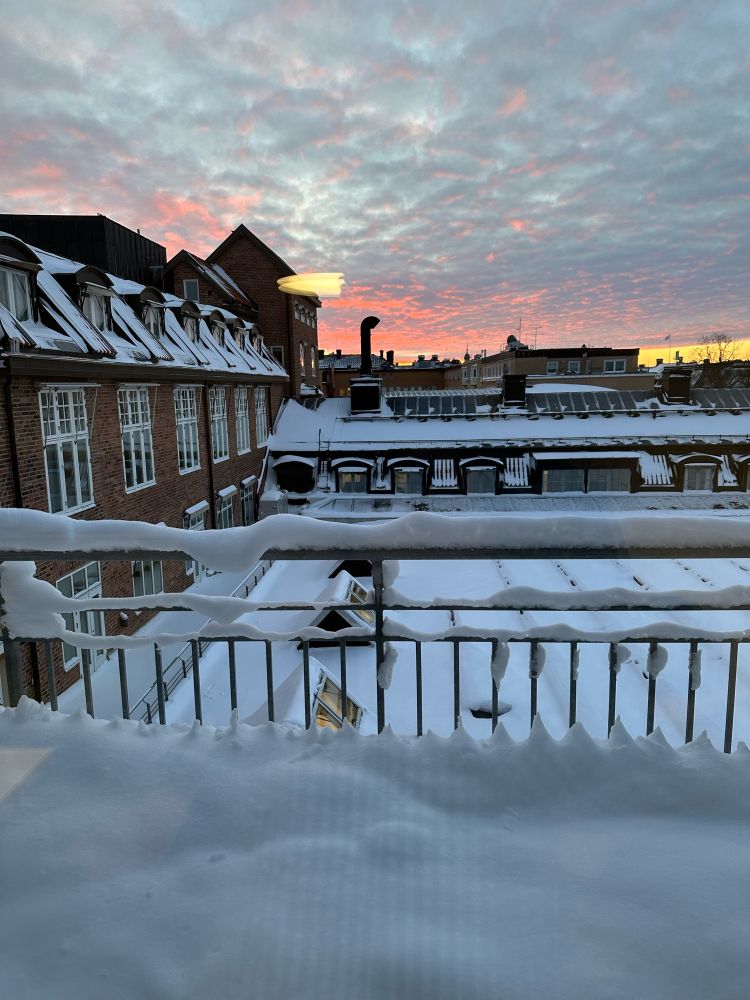
November 22, 2024 at 7:03 AM
This view this morning. 🥰 Department of Government, Uppsala University polisky
Tonight, I will be presenting joint work with @rafaelahlskog.bsky.social @turnbulldugarte.bsky.social
to a group of pol scientists and economists 😱 at Arizona State University 🇺🇸. Our research shows that the more LGB neighbors an LGB individual has, the more likely they are to vote in elections.
to a group of pol scientists and economists 😱 at Arizona State University 🇺🇸. Our research shows that the more LGB neighbors an LGB individual has, the more likely they are to vote in elections.

November 7, 2024 at 8:22 PM
Tonight, I will be presenting joint work with @rafaelahlskog.bsky.social @turnbulldugarte.bsky.social
to a group of pol scientists and economists 😱 at Arizona State University 🇺🇸. Our research shows that the more LGB neighbors an LGB individual has, the more likely they are to vote in elections.
to a group of pol scientists and economists 😱 at Arizona State University 🇺🇸. Our research shows that the more LGB neighbors an LGB individual has, the more likely they are to vote in elections.
Those not halloweening tonight, come listen to my presentation of a joint paper with @turnbulldugarte.bsky.social & @rafaelahlskog.bsky.social. Using the 🇸🇪 admin data, we show that spatial concentration of lesbians, gays and bis has a positive effect on LGB turnout. docs.google.com/forms/d/e/1F...

October 31, 2024 at 10:57 AM
Those not halloweening tonight, come listen to my presentation of a joint paper with @turnbulldugarte.bsky.social & @rafaelahlskog.bsky.social. Using the 🇸🇪 admin data, we show that spatial concentration of lesbians, gays and bis has a positive effect on LGB turnout. docs.google.com/forms/d/e/1F...
I also use data from two original surveys, one a random and one representative sample, to corroborate these results. The results show that Swedish LGBs are more likely than their straight counterparts to be members of a political party and to express ambition to run for office.

October 21, 2024 at 6:56 PM
I also use data from two original surveys, one a random and one representative sample, to corroborate these results. The results show that Swedish LGBs are more likely than their straight counterparts to be members of a political party and to express ambition to run for office.
Does this gap also lead to a positive gap in access to elected office? No, because safe candidacies are more tightly controlled by party gatekeeping. However, the incidence of "sacrificial lamb" candidacies among LGB candidates decreases over time.

October 21, 2024 at 6:56 PM
Does this gap also lead to a positive gap in access to elected office? No, because safe candidacies are more tightly controlled by party gatekeeping. However, the incidence of "sacrificial lamb" candidacies among LGB candidates decreases over time.
Using the entire adult population of 🇸🇪 matched with a comprehensive candidacy database, I demonstrate that a positive gap in access to political candidacy has indeed emerged over time. This gap is more pronounced at the municipal level, where party gatekeeping is less stringent.
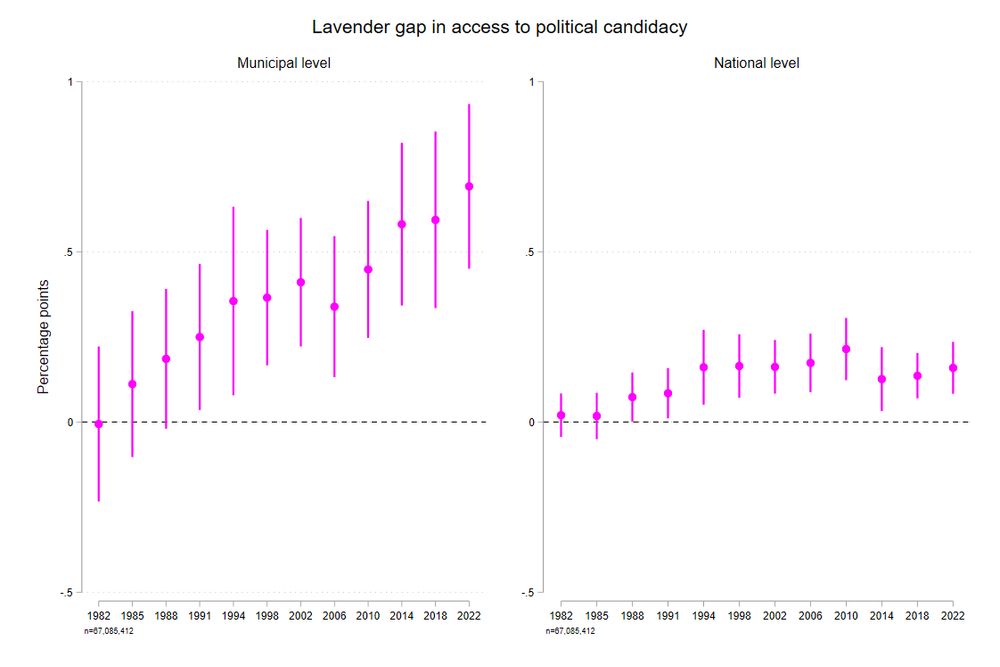
October 21, 2024 at 6:56 PM
Using the entire adult population of 🇸🇪 matched with a comprehensive candidacy database, I demonstrate that a positive gap in access to political candidacy has indeed emerged over time. This gap is more pronounced at the municipal level, where party gatekeeping is less stringent.
We then use roll-call data on all Swedish MPs elected in the last two decades and study potentially heterogeneous effects of disloyalty on MPs' renomination and reelection fortunes. We find no heterogeneities. Figure captures the results for women and men MPs.
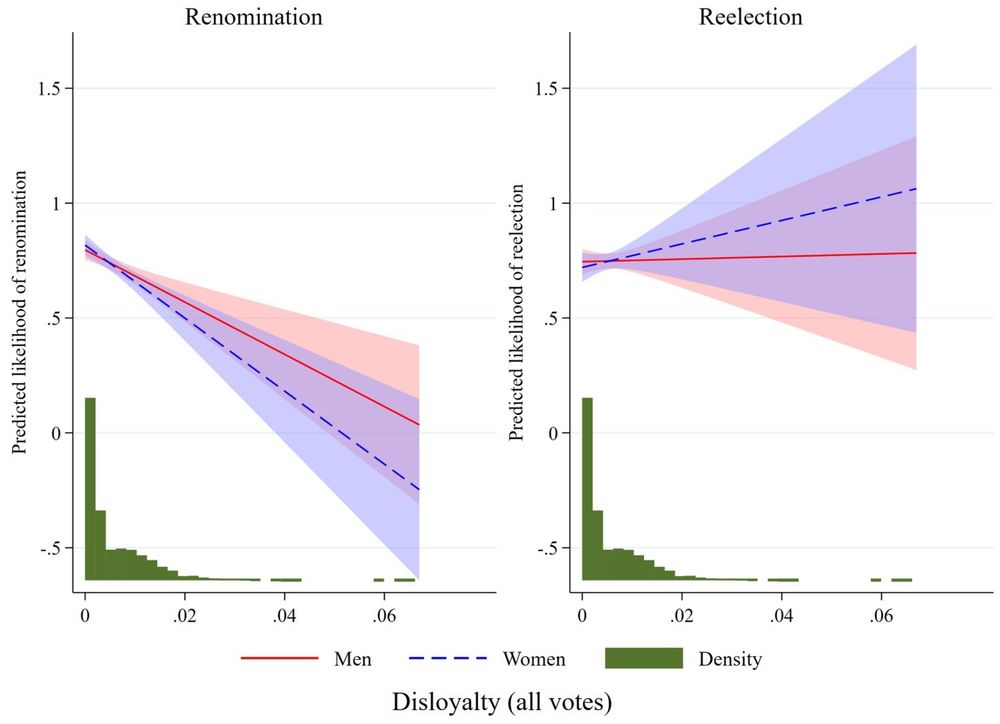
September 4, 2024 at 8:21 PM
We then use roll-call data on all Swedish MPs elected in the last two decades and study potentially heterogeneous effects of disloyalty on MPs' renomination and reelection fortunes. We find no heterogeneities. Figure captures the results for women and men MPs.
We first turn to a conjoint experiment with 1,300 party selectors in Sweden to see whether women, youths, and immigrants need to signal greater loyalty to be deemed suitable for office. This is *NOT* the case. Figure captures candidate appeal at different levels of loyalty.
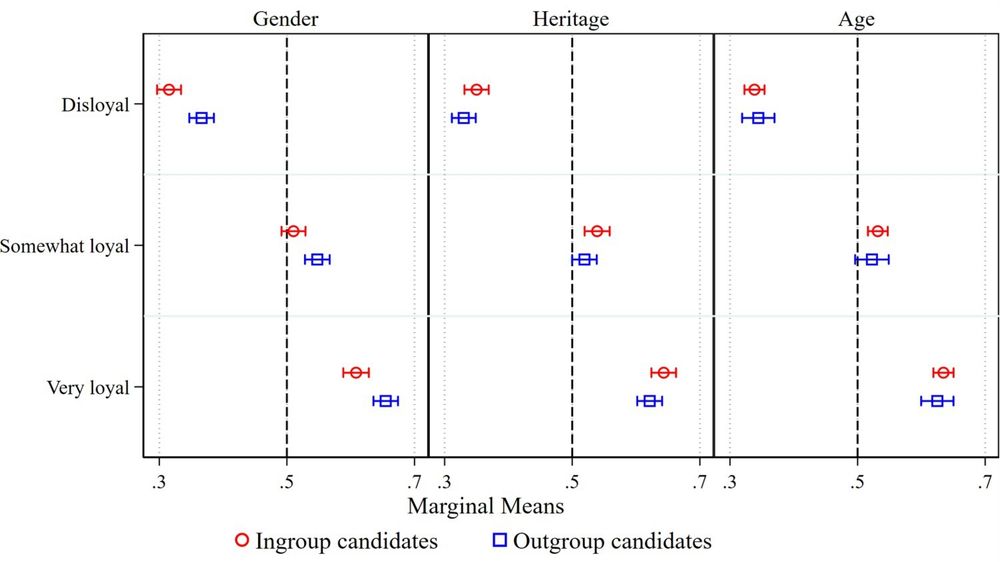
September 4, 2024 at 8:20 PM
We first turn to a conjoint experiment with 1,300 party selectors in Sweden to see whether women, youths, and immigrants need to signal greater loyalty to be deemed suitable for office. This is *NOT* the case. Figure captures candidate appeal at different levels of loyalty.
We focus on evaluations of loyalty, a key criterion for candidate recruitment across political systems. Specifically, we examine Sweden, where loyalty is the most important factor in candidate selection. Figure captures loyalty's weight in determining candidate appeal.
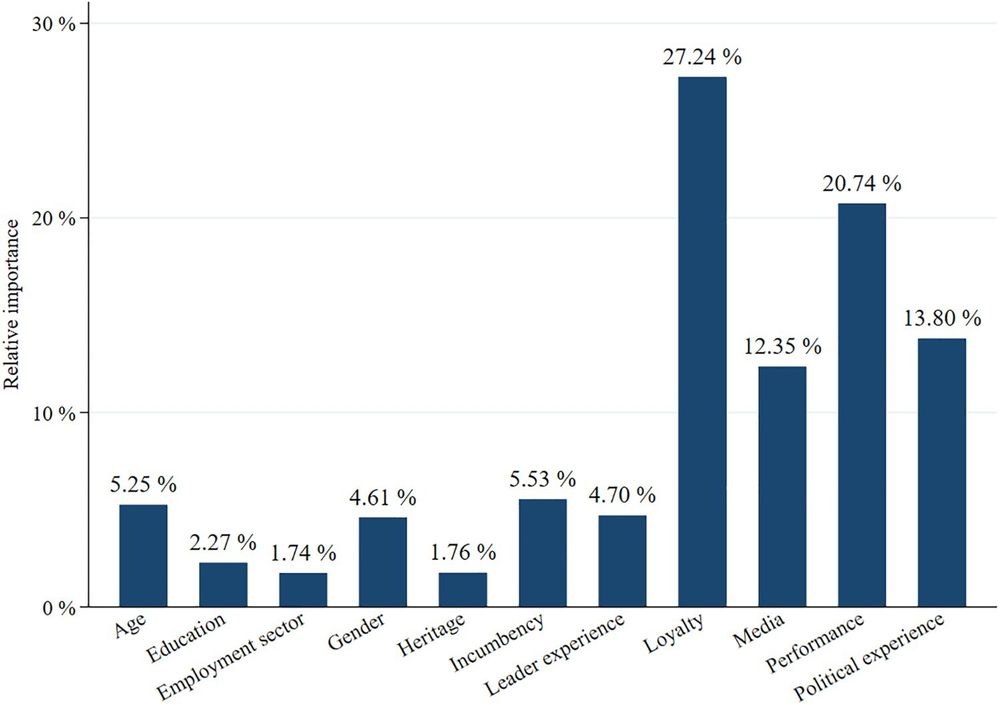
September 4, 2024 at 8:20 PM
We focus on evaluations of loyalty, a key criterion for candidate recruitment across political systems. Specifically, we examine Sweden, where loyalty is the most important factor in candidate selection. Figure captures loyalty's weight in determining candidate appeal.




